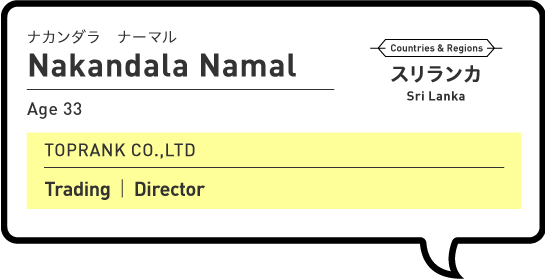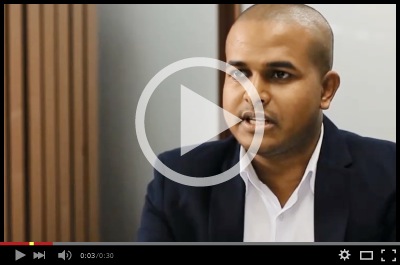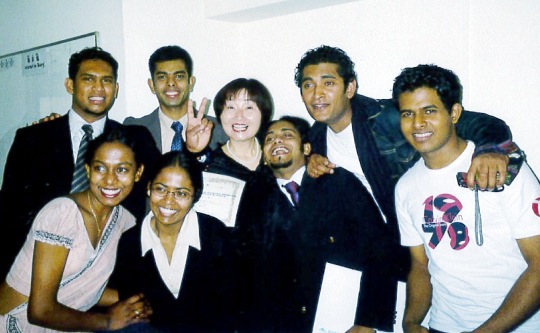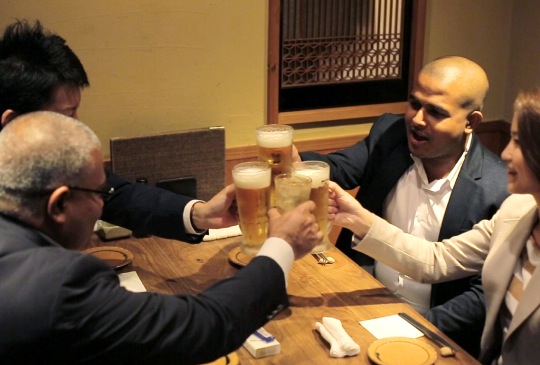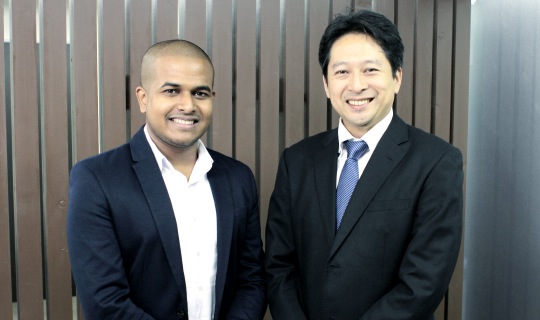![]()
-
Age13
My uncle had a car business in Japan. Even now, I remember him asking me "Why not come to Japan?" -
Age22
I attended a 250-hour Japanese language course in Sri Lanka, but it wasn't nearly enough time and I didn't learn much at all. -
Age23
While attending vocational school in Tokyo, I did a lot of part-time work. Through my encounters, I grew little by little to understand Japanese habits and way of thinking. -
Age26
I overcame the difficulties of job hunting and joined Top Rank. Now I feel like I’m attending the "university of work." -
Age33
Present day
In Tokyo, I learned that there are more important things than money
If it’s just earning money, I think you can do this in any country in the world. Far more important is building relationships of trust with other people and working with responsibility. These things are more important than any certificate or qualification, I think. And essentially, anyone can do them. If you work in the Japanese culture and stay aware of these things, you gain a better understanding. If you learn this, you’ll have increased opportunities and experience, and I think you can also accelerate your growth.
From Tokyo, I launched a company and started developing business in my Sri Lankan homeland
I’m mainly involved in the direction business, and managing the Sri Lanka base we’ve just launched for Top Rank. Recently, I’ve been involved in recruitment in Sri Lanka as well as setting up the office. Aside from this, I’m also doing sales and marketing work for car sales. As part of these activities, as well as cars, we also handle additives used by cars, such as oil. When I’d just joined the company, since I didn’t have any work experience, I was washing cars and taking photos and videos of the car that we were selling. Then I became more involved in the work and sales of exports, and now I’ve been entrusted with the major task of launching our Sri Lanka base. When I got married, back in my home country of Sri Lanka, the company president came from Japan to attend the ceremony. I pitched the potential of the Sri Lanka market to the president at that time, and it was decided we’d start business here. I’m proud that we were the first to open up and develop this market in the car sales business.
We can learn a lot about the important elements in business
In the future, I hope to contribute to business development in Sri Lanka. To that end, I have been learning a lot at my current workplace. I really do think of this company as my university. The ability to learn so much while I’m working is the most attractive thing about Tokyo for me. At first, I had a very hard time—I didn’t have a solid understanding of the Japanese language or the Japanese mindset. It was a tough time for me, but I actively tried to enter this world on my own terms. I become gradually accustomed to it, and I grew to understand all the outstanding characteristics of Japanese businesspeople, such as taking responsibility for one’s own statements, firmly respecting any commitments made, and treating other people's time as valuable. I learned that, in fact, undertaking business like this is a very important element in making it grow.
For people like us, living abroad among people and cultures that are different from our own, trust is especially important when doing business. And building relationships of trust takes time. I will strive to apply the lessons I learned in Tokyo to business in Sri Lanka.
Leaving my home country, I came to Tokyo to improve my language skills
Originally, a relative of mine was working in Japan and was involved in the car export business. When I was still in junior high school, this relative asked me, "Why don’t you come and work in Japan in future?" That incident is still clear in my memory. I thought I’d like to travel to Japan after graduating, so I enrolled in a 250-hour Japanese intensive training program while still in school. But it wasn’t easy, and my Japanese did not improve at all. I realized it’d be faster if I went to Japan to study, so I studied for a few years at a Japanese language school in Tokyo. Although I took a lot of part-time jobs in order to support myself, none of them lasted very long. Still, after graduation I wanted to work in Tokyo. The reason for this was a personal matter—I was in a relationship with a Taiwanese woman (my current wife), who was in Tokyo. After graduating from school, I started job seeking but I had a difficult time and couldn’t find a job immediately. I was gradually reaching the limit of the period I could stay in Japan, and I was feeling frustrated. I heard about my current employer after being introduced by a friend who was working at Top Rank at that time. The decisive factor was originally that I liked cars, so I joined the company.
Having friends and interests means I'm 100% satisfied with my life after work and on weekends!
Although I have fewer opportunities to do so because I’m a parent now, I like to go for a drink with colleagues after work. I love the culture where you feel free to go drinking and freely communicate and tell stories about work or play. A beer tastes great after a hard day’s work. One of the great attractions of Tokyo is being able to experience living freely and independently. In my home country of Sri Lanka, because many people live with their parents it can be difficult to achieve genuine independence and freedom until you reach a certain age. My experience of renting a place, cooking for myself, and living an independent life since I was young has been very valuable.
I have two weekend hobbies. One is photography. I enjoy landscape photography using a Japanese-made single-lens reflex camera. I never get bored because there are so many locations to shoot in Tokyo. My favorite landscape is the night view of Tokyo across the bay. Recently, I’ve also been taking a lot of photos of my young children. Another hobby is karaoke. I love to sing. Karaoke culture does not exist in Sri Lanka, and so I enjoy it all the more in Tokyo. When you meet people in Tokyo, you often get a sense of warm, courteous communication. It’s great—I really like it.
Interviews with Corporations
Corporate planning Naoto Inagaki
I believe you all have the ability to expand your potential and help make Japan a more outward-looking country
By working with people from overseas, we’re able to broaden our field of view and expand our potential. By engaging in business with local employees, we can discover things that may not be apparent to our eyes and we can meet people we’d otherwise never meet. It’s great for our business performance too; since we started hiring international employees and Japanese employees with overseas experience, we have nearly doubled in growth. This is because we’ve been able to enter new markets. People from all over the world come to Tokyo, and it’s also home to many Japanese who are internationally active. Some of them just want to work in Japan, I suppose, but as they work in Japan it's possible they'll become human resources that bridge Japan and their home countries. Japan is a wealthy, modern country, but it is also a very introspective island nation. We believe that the foreigners working in Japan can help turn this gaze outward and develop a lot of potential. Some things can be found in their home countries but not in Japan; other things can be found in Japan but not in their home countries—this gap represents an opportunity for both sides. I believe that we should seek to nurture the sort of workers who can discover and provide such opportunities, working hand-in-hand with the Japanese.



